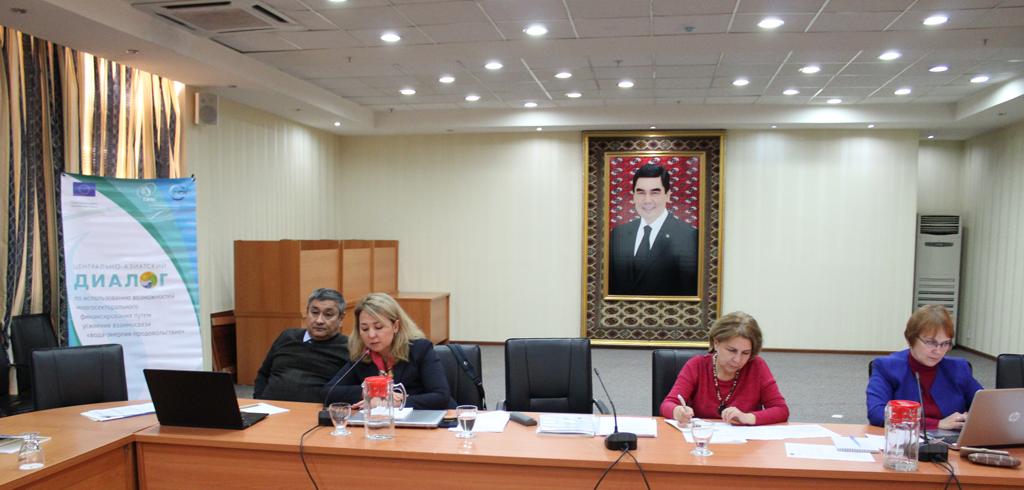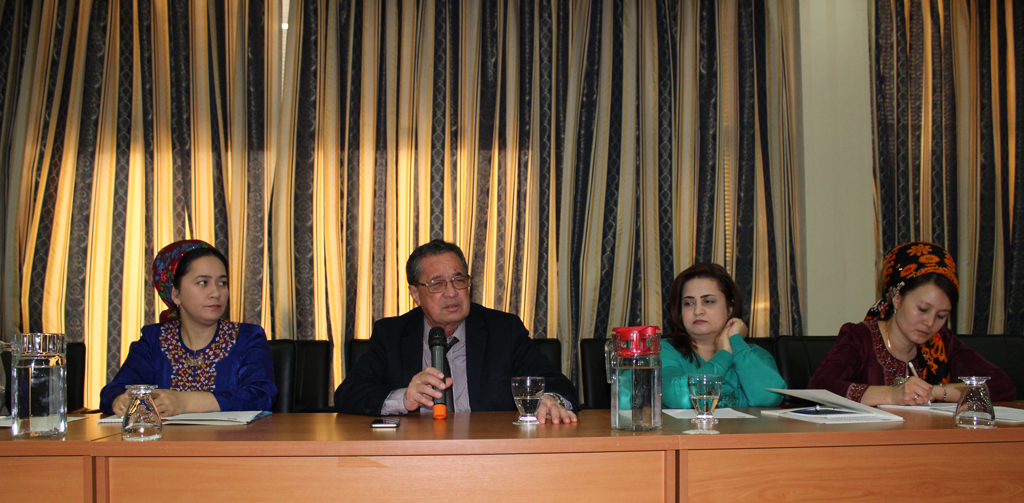
ASHGABAT − On 5-6 December 2018, the meeting of Intersectoral Working Group on the development of multi-sector investment projects for achieving water, energy and food security in Turkmenistan were held in Ashgabat and the workshop for project developers.
The events were organized within the Project "Central Asia Nexus Dialogue Project: Fostering Water, Energy and Food Security Nexus Dialogue and Multi-Sector Investment". The project is funded by the European Union and implemented by the Regional Environmental Centre of Central Asia in partnership with the International Union for Conservation of Nature and with the support of the Executive Committee of International Fund for Saving the Aral Sea. Phase I will last until December 2019 (total budget: €1.52 mln; EU contribution: €1.3 mln).
The main discussion was on ideas of investment projects recommended for elaboration for ASBP-4 by the decision of the third meeting of the Regional Steering Committee of Nexus project (October 12, 2018, Astana). All project ideas were confirmed as relevant. The project idea on the rehabilitation of ecosystems of the Aral Sea basin through forest plantations, the development of collector-drainage system for needs of irrigation and local residents, and the installation of renewable energy sources, proposed by the IFAS Branch in Kazakhstan, will be developed with the support of the Secretariat of the Intergovernmental Commission for Sustainable Development in Turkmenistan. The Secretariat will also support the elaboration of projects on integrated disaster risk management and development the eco-and agro-tourism with elements of ethnic-tourism based on specially protected natural areas (PAs) in the Aral Sea basin.
Mr Lubomir Frebort, Head of the Liaison Office of the European Union in Turkmenistan noted: “The EU strategy for Central Asia stresses the importance of respecting the strategic interests of all five Central Asian countries, while promoting multilateral and regional frameworks of dialogue and increased adhesion to international conventions and legal principles governing the environment, trans-boundary water resource management, and the consequences of the disappearance of the Aral Sea”
One more important result of the day – a selection of the pilot project for testing the benefits of water, energy, food security Nexus approach. It proposes the construction of a traditional hydro technical architectural construction for household purposes – Sardob. The basin, buried in the ground and covered with a stone vault, for collecting, storing and consuming fresh drinking water is the only opportunity for the residents of the Karakum desert to save water for their daily needs and livestock in the harsh days of drought.
During the workshop, the participants were presented the best Nexus practices, collected and described by the International Union for Conservation of Nature. The Liaison Office of the European Union in Turkmenistan presented the financial resources of the EU Investment Fund for Central Asia. The Guide for Investors and the Knowledge Center, prepared specifically for project developers from Central Asia by the EU WECOOP2 project, were also presented.

For additional information, please link us, twitter: #NexusCentralAsia, or contact:
Lyudmila Kiktenko, Project Manager, +7 (727) 265 43 33, lkiktenko@carececo.org
Elnara Bainazarova, Press & Information Officer, EU Delegation to Kazakhstan, Elnara.BAINAZAROVA@eeas.europa.eu
“Central Asia Nexus Dialogue project: Fostering Water, Energy and Food Security Nexus Dialogue and Multi-Sector Investment” or Nexus project is implemented by CAREC in cooperation with the International Union for Conservation of Nature with the financial support of the European Union. The overall objective of the project is to create a multi-sectoral enabling environment to facilitate sustainable and climate-resilient investments for increased water, energy, food security and ecosystems in Central Asia. The project is implemented in five countries of Central Asia (Kazakhstan, Kyrgyzstan, Tajikistan, Turkmenistan and Uzbekistan) during the period 2016-2019

